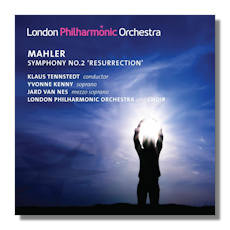
The Internet's Premier Classical Music Source
Related Links
- Mahler Reviews
- Latest Reviews
- More Reviews
-
By Composer
-
Collections
DVD & Blu-ray
Books
Concert Reviews
Articles/Interviews
Software
Audio
Search Amazon
Recommended Links
Site News
 CD Review
CD Review
Gustav Mahler

Symphony #2 "Resurrection"
Yvonne Kenny, soprano
Jard van Ness, mezzo-soprano
London Philharmonic Choir
London Philharmonic Orchestra/Klaus Tennstedt
Recorded live, Royal Festival Hall, 1989
London Philharmonic LPO-0044 2CDs
Klaus Tennstedt was a great conductor, though even the British (who loved him most) considered him erratic. Shy and soft-spoken, he excelled at "big" works like Mahler and Bruckner. He was often let down by either inferior orchestral playing, or a certain sloppiness interpretatively. His studio Mahler is a great example of this. While it has always sold well on EMI – now Warner Classics – it often has a less than alluring London Philharmonic to contend with. His vocal soloists are merely okay, and (except for the Eighth, which is a marvel) all of the performances are lacking in some way. Tennstedt live was a totally different story, and this "Resurrection" Symphony is a knockout.
Having just slept my way through Boulez's Vienna Philharmonic reading on Deutsche Grammophon, I was relieved to hear the opening attacks grip me by the throat. The London Philharmonic is in smashing form, with far more incisive strings and brighter winds than the conductor's decent studio version. Clearly inspired by the live setting, Tennstedt proves far more expressive and involved on the podium. However, this newfound freedom in phrasing never impedes the musical structure of the work. Indeed, every tempo change feels natural and organic, never imposed. Those expecting Leonard Bernstein aren't going to get that, but they will get a more improvisational and exciting Tennstedt. For me, that's plenty enough.
The andante is full of personality, but again also free of mannerism. The brass play wonderfully and warmly, and there is a naturalness that captivates. In a world where Mahler is pulled about and puffed up, this is refreshing. There's a moment near the end of the movement before the opening theme gently returns that I realized my pulse was racing. I can't pinpoint when exactly the conductor started applying the heat, but it's so well done that I had to stop and admire how musically invested he had convinced me to be. The scherzo is outstanding as well, razor-sharp and tremendously built. The "cry of despair" at movement's end has a thrilling build-up and extremely satisfying release. It's audibly superior to many versions, to say nothing of Tennstedt himself in his comparatively tepid studio take.
The "Urlicht" is beautifully sung by the underrated Jard van Ness, and the accompaniment is beyond reproach. The solo work from former London Philharmonic leader David Nolan also deserves mention. So often this movement feels like a stopgap holding us from the finale, but not here. Touching and sincere, this too carries the feeling that comes from a great live event. The finale explodes into being, and only gets better from there. The offstage brass, the woodwinds, the purposeful conducting; it's all marvelous. As with the best English orchestral recordings, the lower half of the orchestra has real presence and bite. The percussion – timpani especially is stunning without ever being crude. Tennstedt takes some extra time versus his studio effort, but almost every moment of that added flexibility serves the music in a new way. The entire finale gains steam as it progresses, somewhat remarkable for a live concert, and the tension is palpable. The choral singing is enthusiastic – though the men are a little rough around the edges – and Yvonne Kenny soars impressively over the orchestra considering the concert setting. The final pages are gloriously drawn out, though playing them this slow isn't to all tastes. I have long been an admirer of Bernstein's second New York Second, and so slow bothers me not a bit. By this late date, Tennstedt was ill and mostly retired. That we have this recording at all is simply a joy.
Copyright © 2015, Brian Wigman




















